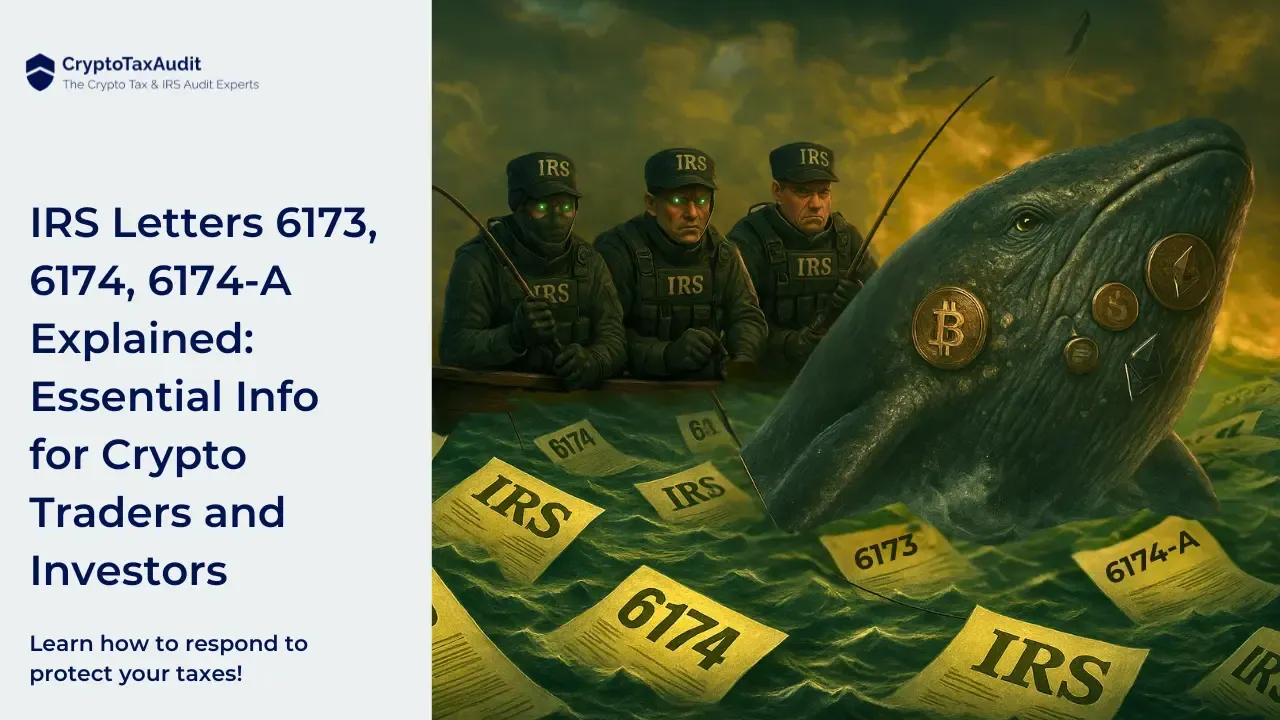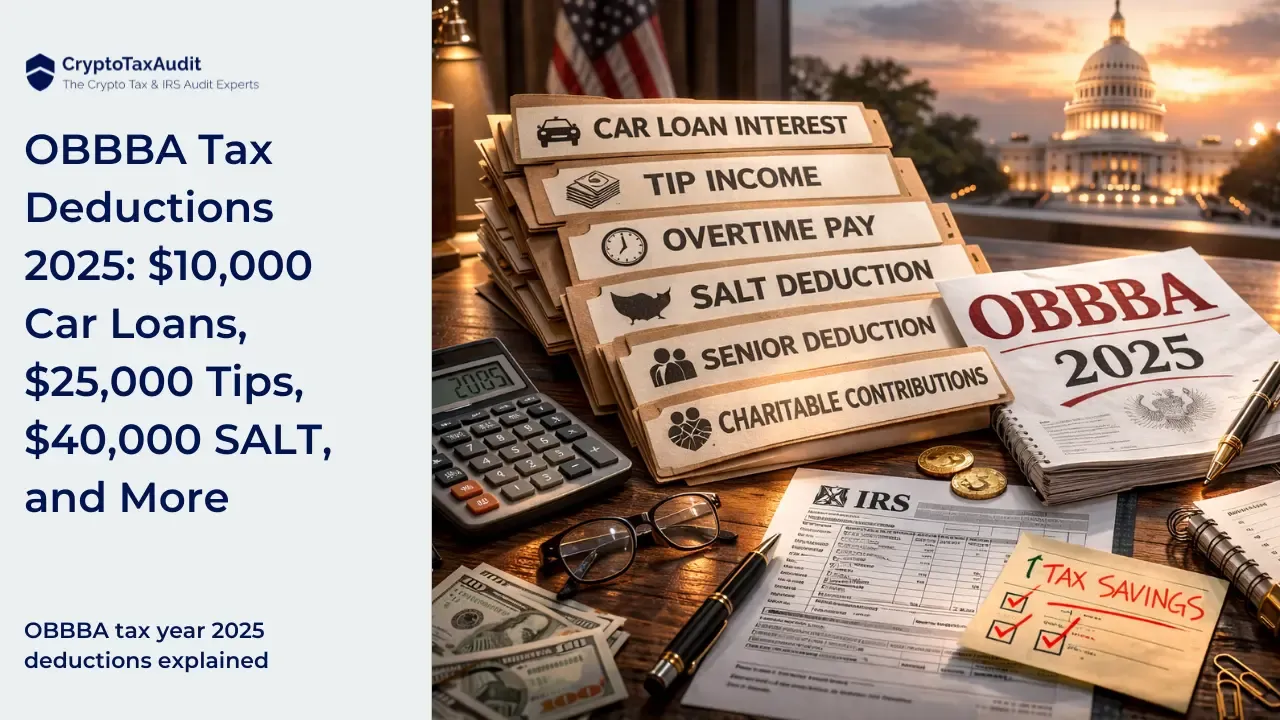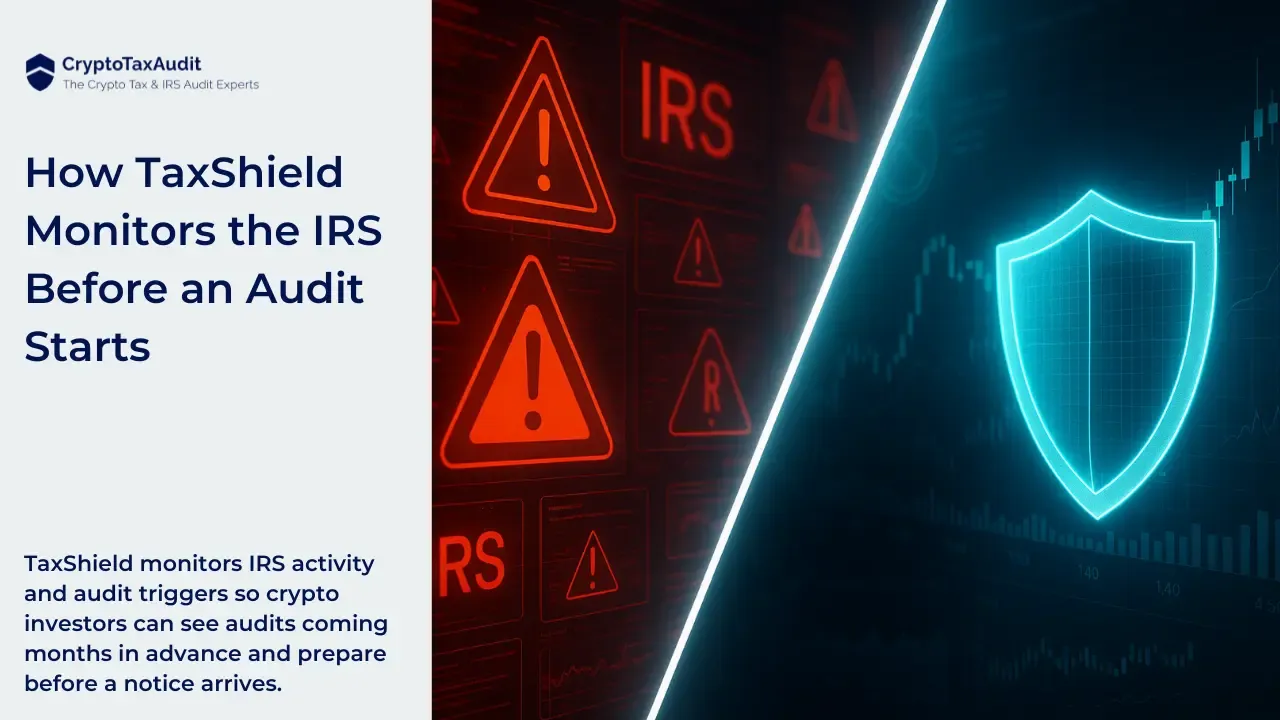
IRS Letters 6173, 6174, 6174-A Explained: Essential Info for Crypto Traders and Investors
KEY TAKEAWAYS
-
IRS Letters 6173, 6174, and 6174-A are official crypto compliance warnings not scams.
-
Letter 6173 is the most serious and may lead to further IRS action if ignored.
-
These letters mean the IRS has data on your crypto activity, often from exchanges like Binance.
-
Responding incorrectly or not responding can trigger audits or penalties. CryptoTaxAudit helps you respond the right way.
If you’ve recently received an IRS letter, you’re not alone.
Thousands of crypto traders are being contacted and yes, it’s serious.
These aren’t phishing scams or spam emails.
They’re official IRS notices aimed at people involved in crypto trading.
Whether you’re just starting out or have been in the market for years, understanding what these letters mean is key to protecting yourself from audits and penalties.
What Are IRS Letters 6173, 6174, and 6174-A?
IRS Letters 6173, 6174, and 6174-A are official notices sent to crypto traders.
Many people mistake them for phishing attempts, but the IRS has been mailing these letters since 2019 as part of its push to ensure crypto activity is properly reported on tax returns.
Here’s a quick breakdown:
Letter 6173
The most urgent of the three.
This letter means the IRS believes you’ve not reported a significant amount of crypto transactions.
It’s not just a gentle reminder it signals that the IRS is paying attention and may follow up. If you get this letter, you should act quickly.
Letter 6174
This letter is less aggressive but still important.
It notifies you that the IRS has identified you as someone who may not have fully reported crypto activity.
It’s essentially a heads-up to review your tax filings.
Letter 6174-A
The mildest of the three, this letter encourages you to check that past crypto transactions were correctly reported. While it’s not as urgent, ignoring it could bring more attention to your file later.
Why Are These Letters Being Sent?
The IRS is cracking down on taxpayers who have underreported or failed to report cryptocurrency gains and transactions.
They’ve gathered information from exchanges like Binance and others, so even if you thought your crypto activity flew under the radar, it likely didn’t.
These letters are designed to prompt taxpayers to review their filings.
The IRS may not know the full details like the size of your trades or whether you had gains or losses but they know you were active, and they want answers.
What Should You Do if You Receive One of These Letters?
- Take It Seriously
These letters aren’t junk mail. The IRS has systems in place to monitor taxpayers, and crypto traders are increasingly on their radar.
If you receive Letter 6173, for example, that’s a clear sign you need to review your situation carefully.
- Know the Limits on Amending Returns
It’s tempting to think you can just amend your old tax returns, but be aware: you usually only have three years to do that.
For example, as of May 2025, the 2021 tax return can no longer be amended. So even though the IRS may be referencing past years, you may be limited in what you can correct.
This makes handling your response even more delicate.
- Work with CryptoTaxAudit
When it comes to IRS crypto letters, generic tax advice isn’t enough you need experts who understand crypto taxes inside and out.
That’s where CryptoTaxAudit comes in. Our team focuses specifically on helping crypto traders address IRS concerns, sort out reporting issues, and reduce risks.
Whether you traded on Binance or other platforms, we know how to help you prepare the right response and keep your filings on track.
Before you respond, let our team help you evaluate your situation and build a smart plan.
- Have a Risk Plan
Once you’re on the IRS’s radar, it’s smart to monitor your tax situation more closely going forward. With the right strategy, you can stay compliant and reduce the risk of further IRS action.
We can help you set up a practical plan for managing your crypto tax exposure going forward.
Why It’s Critical to Respond the Right Way
Responding incorrectly or not at all can increase the chance of penalties or even trigger an audit. Even if you think you’ve reported everything, the IRS may see things differently.
A careful, well-prepared approach helps prevent small issues from turning into big problems.
Final Thoughts
Receiving IRS Letter 6173, 6174, or 6174-A isn’t the end of the world, but it’s not something to brush off.
These letters are part of the IRS’s push to improve crypto tax compliance.
If you get one, reach out to CryptoTaxAudit.
Our team has helped hundreds of traders handle these exact situations, and we’re ready to help you too.
Frequently Asked Questions:
Q: What makes CryptoTaxAudit different from other crypto tax firms?
A: Unlike most services, CryptoTaxAudit handles everything from gain calculations to IRS defense and weekly monitoring. They don’t just file they protect.
Q: What is Tax Shield?
A: It’s CryptoTaxAudit’s IRS monitoring service that tracks your IRS account weekly and alerts you to potential issues before the IRS sends a notice.
Q: I have a mess of wallets and exchanges. Can you help?
A: Yes. Their team specializes in forensic crypto accounting, even for clients with tens of millions of transactions and missing data.
Q: What if I’m already being audited?
A: CryptoTaxAudit can step in during an audit. They’ve defended clients all the way to U.S. Tax Court and won.
Q: How do your prices work?
A: All services are based on trade volume, not hourly billing. You’ll get a fixed quote with no surprises.
Want the audio version? Click here to watch the narrated blog on YouTube.





